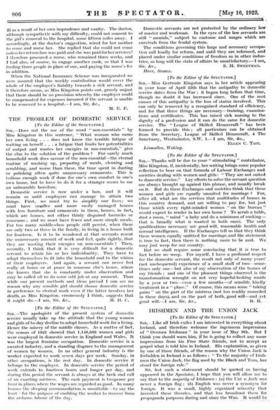[To the Editor of the SPECTATOR.] SIR,—The apologist4 of the
present system of domestic service usually take up the attitude that the young women and girls of to-day decline to adopt household work for a living. Hence the misery of the middle claSses. As a matter of fact, the census of 1921 showed that 1,148,698 women and girls were employed in domestic_service in England and Wales. It was the largest .feminine occupation. Domestic service is a sweated industry, and a standing disgrace to the management of women by women. In no other general industry is the worker expected to work • seven days per week. Sunday, in other occupations, is the rest day. In domestic service it belongs to the employer. In domestic service the period of work extends to fourteen hours and longer per day, and during this period the servant is always at the beck and call of an exacting mistress. The cash payment is twopence per hour in places where the wages arc regarded as good. In many houses the sleeping accommodation is unsuitable—to say the least-L-for the purpose of enabling the worker to recover from the arduous labour of the day.. Domestic servants are not protected by the ordinary law of master and workman. In the eyes of the law servants are still " menials," subject to customs and usages which are survivals from the feudal system.
The conditions governing this large and necessary occupa- tion call loudly for reform, and until they are reformed, and placed under similar conditions of freedom as in other indus- tries, so long will the state of affairs be unsatisfactory.—I am,










































 Previous page
Previous page